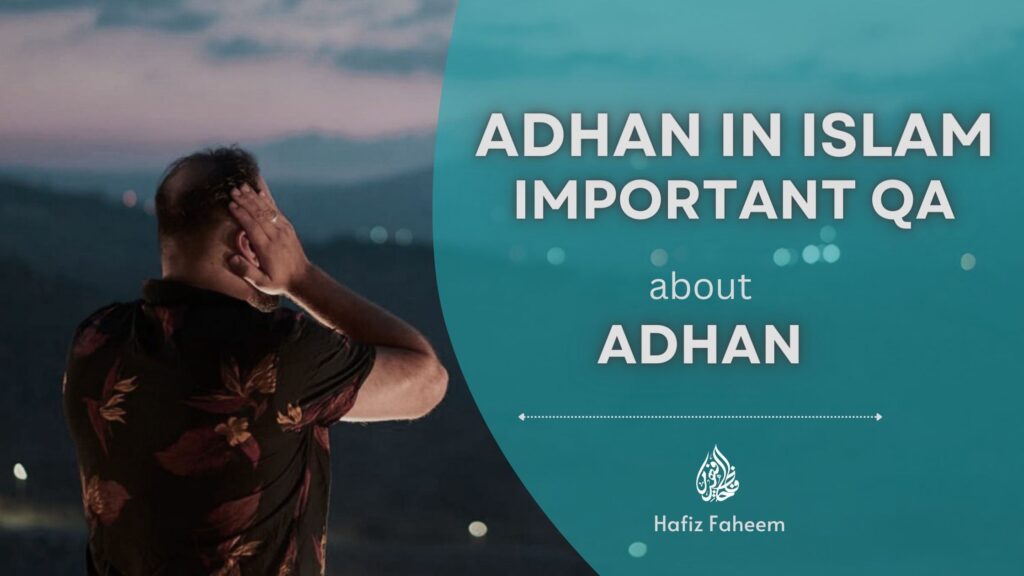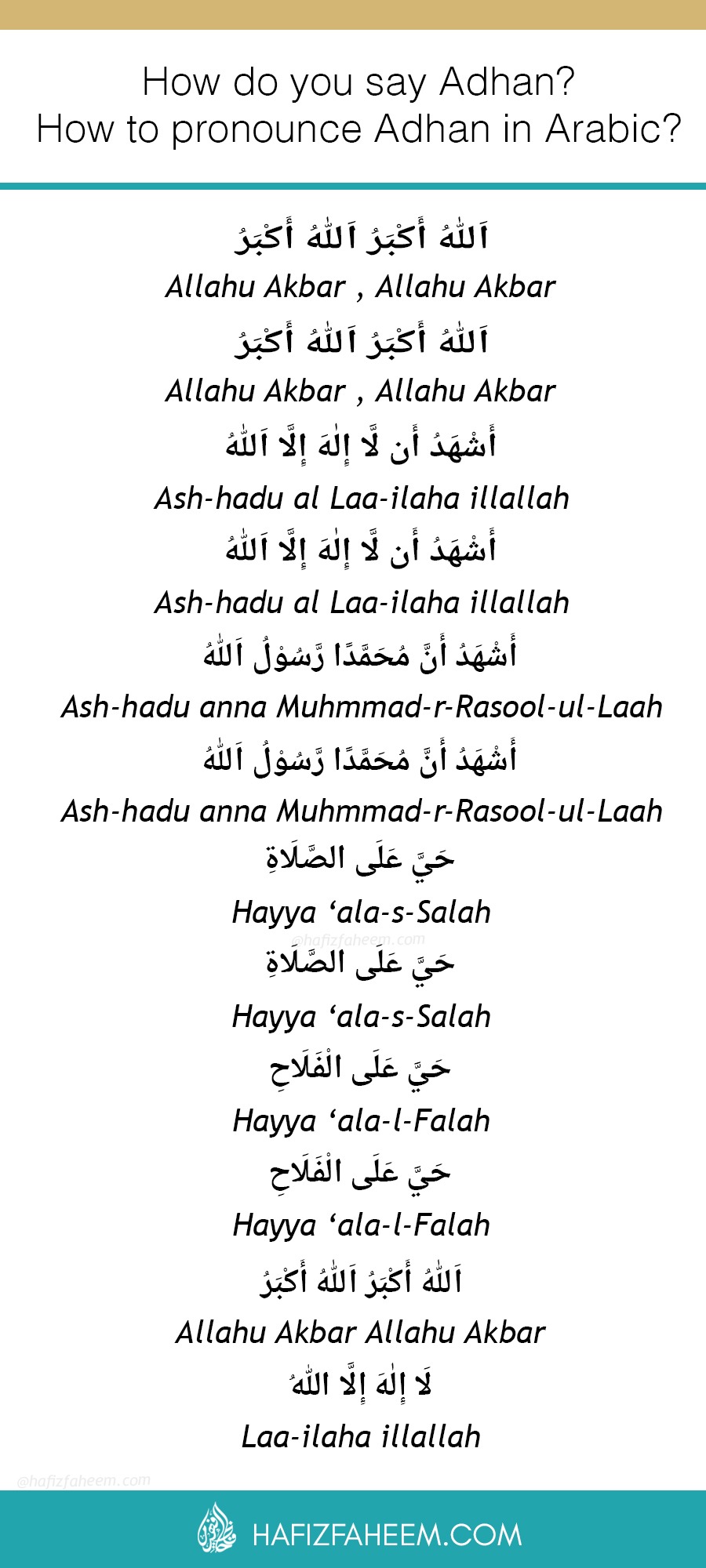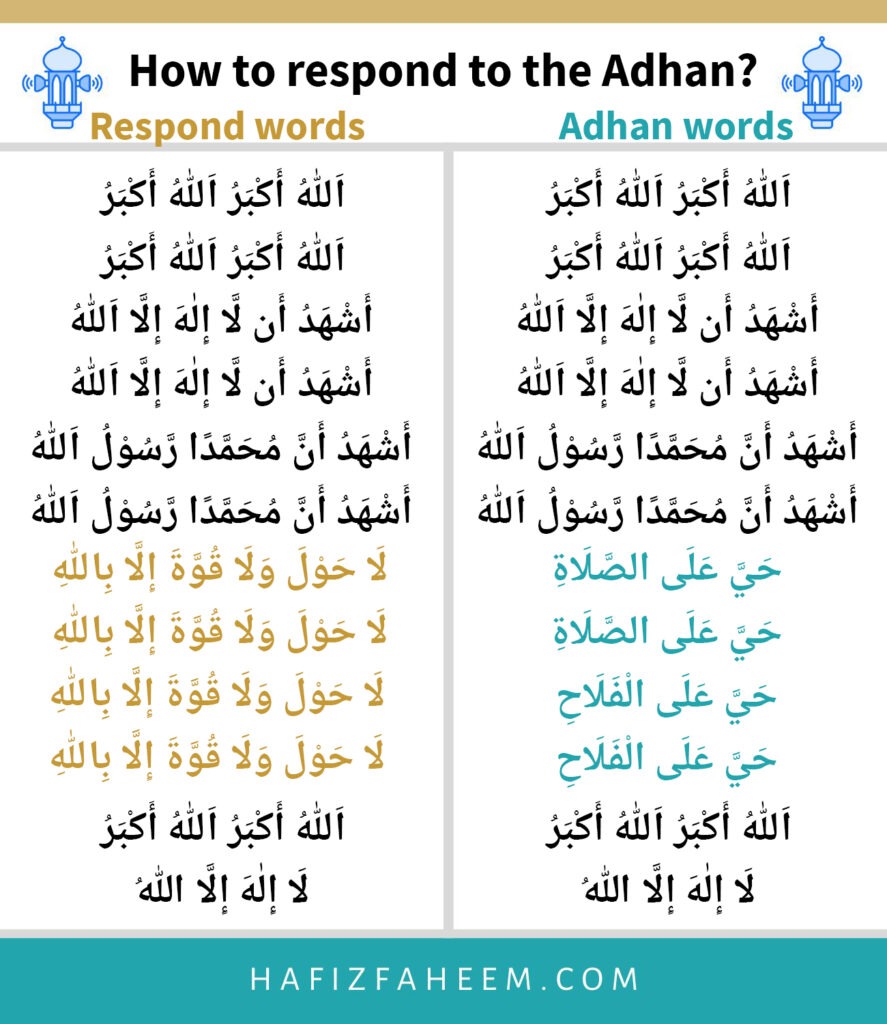
Adhan in islam - Important QA about Adhan
Adhan is the call to prayer that is heard every morning and evening five times a day in mosques throughout the world. Adhan is considered a sign and symbole of Islam. It is religious obligation for all Muslims.
Usually the prayer commences between 10-15 minutes after the Athan in Muslim countries or prayer. which is to inform us the prayer is now starting.
The Athan is a very powerful aspect of the religion as it glorifies Allah but also calls you to do goodness.
What is the meaning of Adhan?
The Adhan, Athan, or azan, means الإعلام ، النداء notification, call.
Adhan (A call to prayer) is the specific collection of phrases, through which Muslims are called to gather for five daily prayers.
Informing the time of prayer in well-known words, in the prescribed time. It is recited harmoniously by a muezzin, calling the Muslim faithful to the five daily prayers (salāt) the times.
In Islam, the Athan is an integral part of our religion. Its purpose is to inform us Muslims the time for prayer has entered.
Is adhan compulsory?
Adhan is Sunnah Muakkadah, which is close to Wajib. It is the symbol of Islam.
And without the Adhan, It is a sin to pray in the Masjid. But the prayer will be valid.
When the Athan is called in a nearby Masjid and it has been heard by people, then abandoning the adhan is not sinful, whether it is an individual or congregational prayer.



Is it necessary to respond to the Adhan?
Upon hearing the Adhan, we have to give two types of responses:
1. Practical answer
2. Verbal answer
After hearing Adhan, going to the Masjid for prayer, is the practical answer, which is obligatory and mandatory.
And repeating the words of the Adhan, its verbal answer, which is Mustahab (desirable). Verbal answers has many benefits.
If a person who is already present in the mosque does not have to give a practical answer, but a verbal answer will still be Mustahab.
However, the second Adhan on Friday will not be answered verbally.
What if I hear so many Adhan in one place, should I respond to every adhan?
If there are multiple Adhans, the first one will be answered.
Whether it is the Athan of his Mosque or the Adhan of a nearby Mosque. Because as soon as he heard the Athan, the response became Mustahab for him, then it will not be repeated again and again. So it is Mustahab to respond only the first Adhan.
If you missed the first Adhan, then you can respond to other Adhan.
What is the Reward of responding Adhan?
- will be assured of Prophet Muhammad ﷺ intercession
‘Abdullah b. Amr b. al-As reported Allah’s Messenger (ﷺ) as saying:
When you hear the Mu’adhdhin, repeat what he says, then invoke a blessing on me, for everyone who invokes a blessing on me will receive ten blessings from Allah; then beg from Allah al-Wasila for me, which is a rank in Paradise fitting for only one of Allah’s servants, and I hope that I may be that one. If anyone who asks that I be given the Wasila, he will be assured of my intercession. Muslim:384
- will enter Paradise
The Messenger of Allah (ﷺ) said:
When the Mu’adhdhin says: Allah is the Greatest, Allah is the Greatest, and one of you should make this response: Allah is the Greatest, Allah is the Greatest; (and when the Mu’adhdhin) says: I testify that there is no god but Allah, one should respond: I testify that there is no god but Allah, and when he says: I testify that Muhammad is the Messenger of Allah, one should make a response: I testify that Muhammad is Allah’s Messenger. When he (the Mu’adhdhin) says: Come to prayer, one should make a response: There is no might and no power except with Allah. When he (the Mu’adhdhin) says: Come to salvation, one should respond: There is no might and no power except with Allah, and when he (the Mu’adhdhin) says: Allah is the Greatest, Allah is the Greatest, then make a response: Allah is the Greatest, Allah is the Greatest. When he (the Mu’adhdhin) says: There is no god but Allah, and he who makes a re- sponse from the heart: There is no god but Allah, he will enter Paradise. Muslim:385
How do you say Fajr Adhan?
Just add the words “Assalatu khairum minan Nawm” 2 times after saying “Hayya Alal Falah”. And the rest of Adhan is same.
What is the meaning of Assalatu Khairum minan NAWM?
The meaning of Assalatu Khairum minan NAWM is “Prayer is better than sleep”.
How to respond “As Salatu Khairum minan Naum” in Fajr Adhan?
Respond with these words: Sadaqta wa Bararta
It was Bilal who added in the Adhan “As Salatu Khairum minan nawm” (Prayer is better than sleep) twice. When He found the Prophet Muhammad lying down. Then the Prophet said: “How good this is, O Bilal, put it in your Adhan.” Tibrani
What is the permissible time to perform a prayer? What is the time between adhan and Iqamah?
Jabir [bin Abdullah] narrated:
“Allah’s Messenger said to Bilal: “O Bilal! When you call the Adhan then do so deliberately and slowly, and when you call the Iqamah then be quick. Allow enough time between your Adhan and Iqamah for the person eating to finish what he is eating, the person drinking to finish what he is drinking, and the one who needs time to relieve himself, and do not stand until you see me.”
Usually, Masajid schedule the prayer time as following:
Fajar Jamat after 30 minutes of Adhan
Dhuhr, Asar and Isha Jamat after 15 minutes of Adhan. So people can make wudu or stop their work and arrive in Masjid. And they can found the time to perform sunnah in that time.
Maghrib just after the Adhan, but its better to keep 2 to 3 minutes.
But in Fajar waking up and making wudu or ghusal it takes time. That’s why 30 minutes is good gap for Fajar. Except the Maghrib, according to the Hanafi Fiqh, since the time of Maghrib is short. So jamat done after the Adhan.
The purpose of the Adhan is to inform people that it is time for prayer, so that they come to the mosque and pray in congregation. Therefore, there must be such a gap between the Adhan and the Iqamah that after hearing the Adhan, a person should complete his essential needs, perform ablution and come to the mosque, so that his first Takbeer does not miss.
Muhaddith Ibn Batal says:
لاحدّ لذلک ، غیرتمکن دخول الوقت واجتماع المصلین
(Ibn Hajar Asqalani, Fateh al-Bari, Beirut, 1/715)
“There is no limit to it, except that the time comes and the Muslim gathered for prayer.”
Short Note:
If you are praying in a mosque then of course you will follow the timetable of the mosque. If you are praying by yourself then you can pray as soon as the time for that particular prayer starts. If you can hear the azan then as a sign of respect you should wait for it to end, otherwise you can start your prayer immediately.
What is Dua upon hearing the Adhan voice?
اَشْهَدُ اَنْ لَّا اِلٰهَ اِلَّا اللهُ وَحْدَهٗ لَا شَرِیْکَ لَهٗ، وَاَشْهَدُ اَنَّ مُحَمَّدًا عَبْدُهٗ وَرَسُوْلُهٗ، رَضِیْتُ بِاللّٰهِ رَبًّا وَّ بِمُحَمَّدٍ رَّسُوْلًا وَّ بِالْاِسْلَامِ دِیْنًا
Ahshadu al lailaha illalahu wahdahu lasharika lahu, wa ashhadu anna Muhammadan abduhu wa rasooluh, Radheetu billahi rabban wa bi muhammadin rasoolan, wa bil Islami deenan.
What is the reward of Reciting Dua upon hearing the Athan voice?
- Sins would be forgiven
The Messenger of Allah (ﷺ) said:
If anyone says on hearing the Mu’adhdhin: I testify that there is no god but Allah alone. Who has no partner, and that Muhammad is His servant and His Messenger, (and that) I am satisfied with Allah as my Lord, with Muhammad as Messenger. and with Islam as din (code of life), his sins would be forgiven. Muslim:386
Should I make dua after Adhan?
Dua can be asked at any time. There is no prohibition in making Dua in the Holy Shari’ah regarding any time, but mentioning Allah with the tongue (Zikr bil Lisan-ذکر باللسان) while in the toilet or while naked is prohibited.
Dua between Athan and Iqamah
Whoever, it has been mentioned in hadiths about certain times that dua is more accepted during these times, so it is mentioned in hadith sharif that: لَا يُرَدُّ الدُّعَاءُ بَيْنَ الْأَذَانِ وَالْإِقَامَةِ ، رَوَاهُ النَّسَائِيّ “dua made between the time of adhan and iqamah is not rejected.”
Therefore, according to this hadith, if after the adhan the Masnoon Dua (which is well-known) and after reciting Durood Sharif until Iqamah, whatever dua is asked there is more hope of its acceptance.
Visit our Blog page for more articles
Share this article on Social Media. Thank You!

